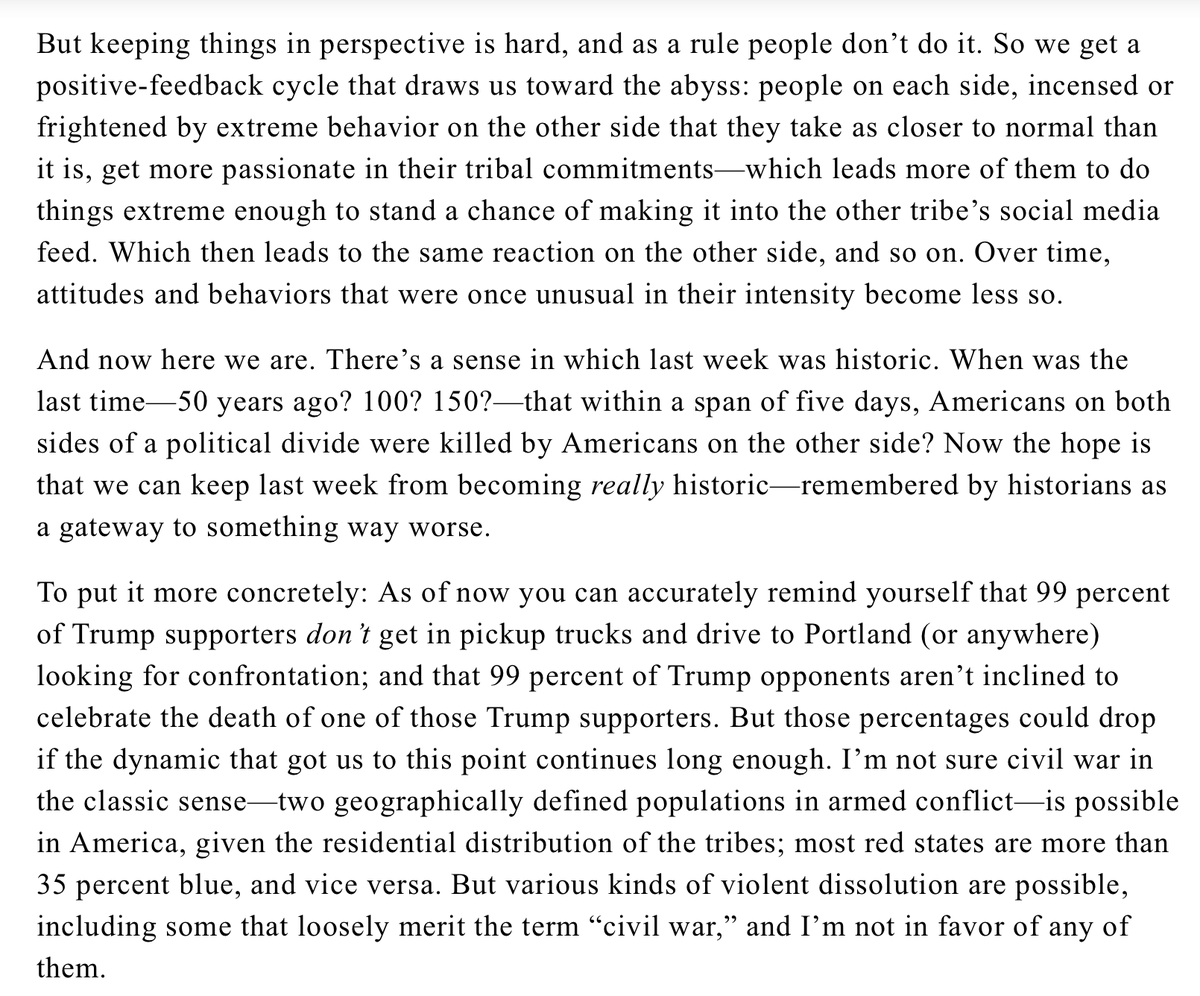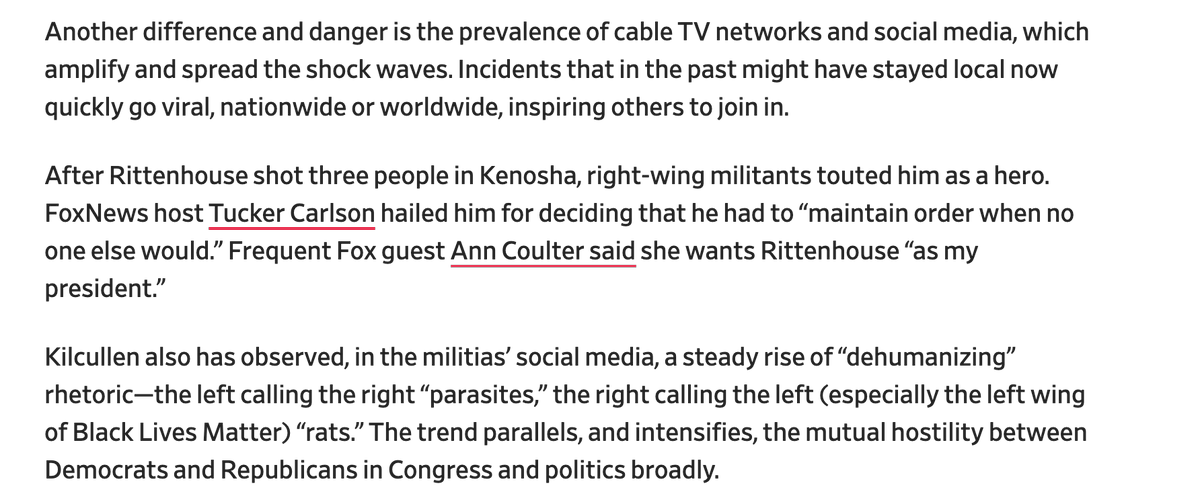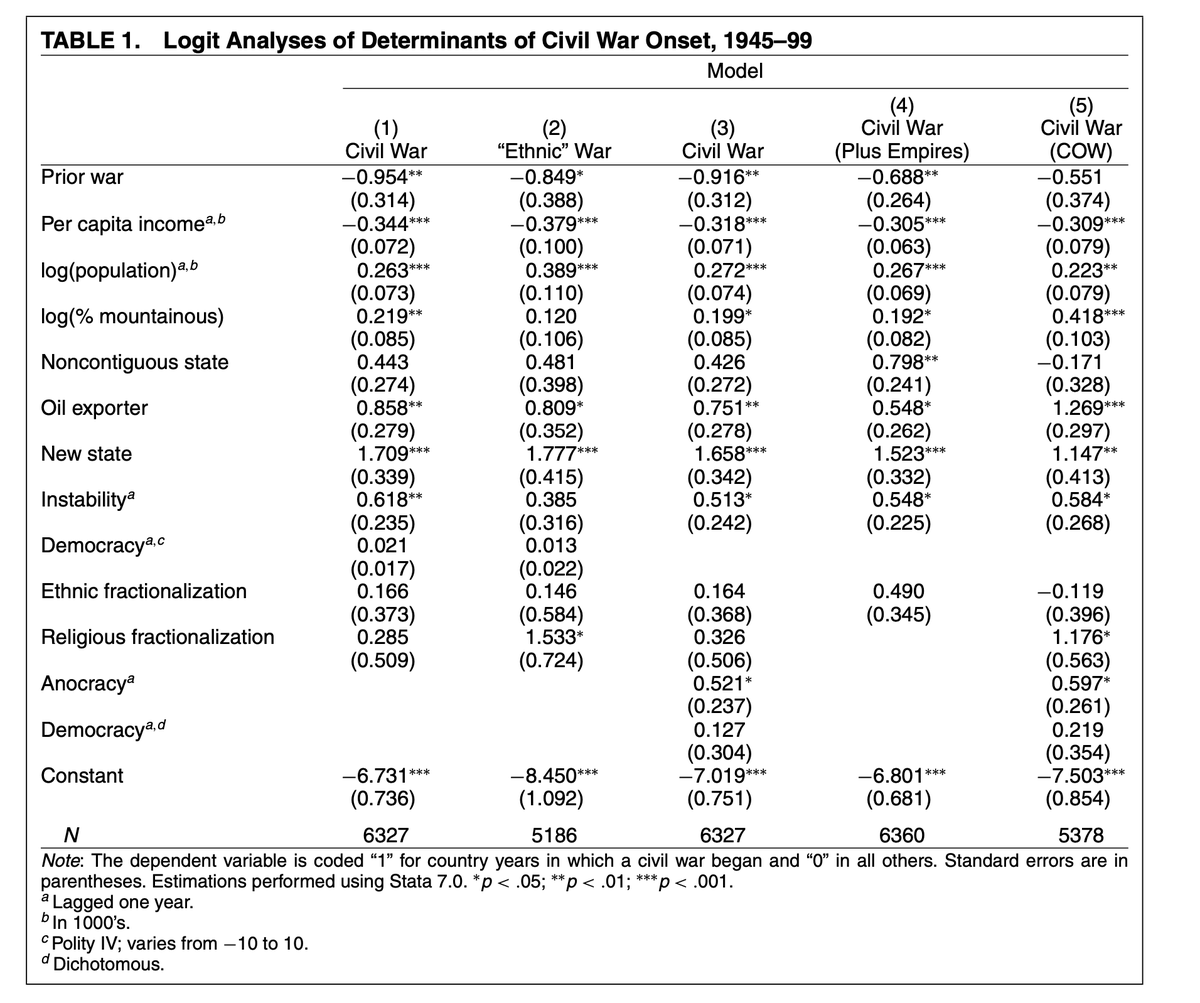I& #39;ve seen a lot of talk about the US heading towards civil war. I think this view is wrong, and it& #39;s wrong for interesting reasons, as the argument reveals fundamentally mistaken assumptions about the causes of political violence. Thread. 1/n
For example, here& #39;s @robertwrighter, who I& #39;m a big fan of. In this view, civil war is a matter of psychology. If people hate each other enough, they& #39;ll start killing each other in the streets. David Kilcullen, less insightful, makes a similar argument. 2/n https://nonzero.org/post/avoiding-civil-war">https://nonzero.org/post/avoi...
Scholars of civil war have divided theories of its causes into two categories: grievance and opportunity. In the grievance model, civil war happens when people are mad enough at their government or fellow citizens to take up arms. 3/n
In the opportunity model, violence is ubiquitous, and when government is weak, criminals, demagogues, etc. will always be there in order to tap into grievances, whether real or imagined. 4/n
The models have different policy implications. The opportunity model puts a premium on "law and order" and fighting the threat of violence directly, while the grievance model leads to a "root causes" approach. 5/n
The statistical literature is clear that the opportunity model is correct. Some things that predict civil war (opportunity): weak states, transition periods, mountain ranges and other geographical features that make establishing govt control difficult. 6/n
Some things that tend not to, or weakly predict civil war: dictatorship, discrimination, violations of human rights, ethnic fractionalization. Fearon and Laitin is the classic work in this genre. 7/n
Paul Collier and Anke Hoeffler formulate the question as "greed versus grievance," and find similar results. Disorder breeds opportunity, and natural resources increase the potential payoff of rebellion. 8/n https://ora.ox.ac.uk/objects/uuid:7c6ea647-eb62-4bb2-ba18-4267010e4913/download_file?safe_filename=2002-01text.pdf&file_format=application%2Fpdf&type_of_work=Working+paper">https://ora.ox.ac.uk/objects/u...
Within civil wars you see the same pattern. Governments tend to hold cities, while rebels are more successful in the countryside. It& #39;s not because city dwellers are inherently less hateful and more satisfied, it& #39;s because violence emerges where the state is weak. 9/n
The American invasions of Iraq and Afghanistan provided a sort of experiment for testing these theories. The US removed brutal dictatorships in the belief that the people would be so grateful they& #39;d welcome American troops, but increased opportunity for gangs, militias, etc. 10/n
"Hearts and minds" counterinsurgency, pushed by Kilcullen, Petraeus, and others, was based on the grievance model, and America& #39;s disastrous experience over the years in nation building have proven it wrong. 11/n
GDP is correlated with civil war because poorer countries have less resources they can put towards establishing order. No country as rich as the US has ever faced a civil war. A rich govt will always work well enough to prevent it no matter how much we hate each other. 12/n
CHAZ/CHOP showed how easily a "rebel movement" can be crushed with the most minimal govt effort. One or two shootings was enough for even the most liberal city to put its foot down, even though it shouldn& #39;t have gone on for that long. 13/n
In recent years, we& #39;ve been getting better at controlling violence of all kinds in first world countries, including crime. Grievance theories of crime have likely reversed that trend recently, but that doesn& #39;t mean we& #39;re close to a civil war, or that it& #39;s likely. 14/n
The civil war literature has broader lessons we can apply to violent crime. The idea that police are the problem is dangerous, and has and will continue to lead to deaths. Civil war is a different matter. The state will tolerate crime, it won& #39;t tolerate ideological rivals. 15/n
I hope this discussion can lead us away from worrying about something that is very unlikely to happen, civil war, and towards worrying about crime, which is at absurdly high levels compared to other rich countries and likely getting worse. 16/n
People are more likely to surrender their civil liberties when you call something a "national security threat" like white nationalism or Islamic terror. But street crime will kill many more Americans every year for the rest of our lives, and we are much more tolerant of it. 17/n
See here for my critique of counter-insurgency theory, seen in light of the civil war literature. 18/n https://ndisc.nd.edu/assets/320266/coin_manuscript.5.8.19.pdf">https://ndisc.nd.edu/assets/32...
I& #39;ve seen people mention Peter Turchin& #39;s theory of violence. It& #39;s basically another grievance model, and therefore incorrect. See this thread for my critiques of it. 19/n https://twitter.com/RichardHanania/status/1273258761382031360">https://twitter.com/RichardHa...

 Read on Twitter
Read on Twitter




